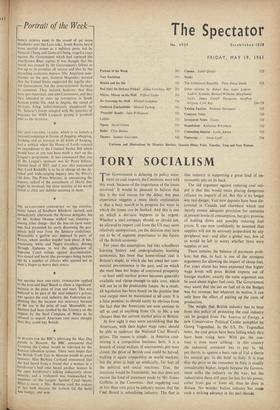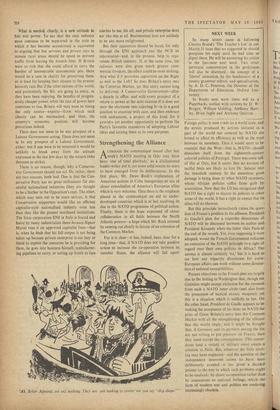TORY SOCIALISM
rr HE Government is delaying its policy state- ' ment on coal imports, the Commons were told this week, 'because of the importance of the issues involved.' It would be pleasant to believe that this is the real reason for the delay; but past experience suggests a more likely explanation is that a busy search is in progress for ways in which the issues can be burked. And this is one on which a decision happens to be urgent. Whether a steel company should, or should not, be allowed to import coal from the US may seem relatively unimportant; yet the decision may turn out to be of supreme importance to the future of the British economy.
For years the assumption, fed into schoolboys learninK history and undergraduates learning economics, has been that home-mined coal is Britain's staple, to which she has owed her com- mercial pre-eminence in the past, and on which she must base her hopes of continued prosperity —at least until nuclear power becomes generally available and cheap- enough to take over, which will not be in the predictable future. As a result, all legislation has been based on the premise that coal output must be maintained at all costs. It is a false premise; as should surely be obvious from the fact that the Americans are now anxious to sell us coal at anything from 15s. to 30s. a ton cheaper than the current market price in Britain.
At first sight it may seem astonishing that the Americans, with their higher wage rates, should be able to undercut the National Coal Board's prices. The reason is simple: in America coal- mining is a competitive business; here, it is a branch of social welfare. If uneconomic pits were closed, the price of British coal could be halved, making it again competitive in world markets; but the price is kept up artificially, for fear of the political and social reactions. True, the reactions would be formidable; but that does not excuse the kind of statement made by Mr. James Griffiths in the Commons—that supplying coal at less than cost price to industry means that the Coal Board is subsidising industry. The fact is
that industry is supporting a great load of un- economic pits on its back.
The old argument against reducing coal out- put is that this would mean placing dangerous reliance on imports of oil. But this is no longer any real danger. Vast new deposits have been dis- covered in Canada and elsewhere which not merely ensure adequate provision for centuries at present levels of consumption, but give promise of holding down and possibly reducing fuel prices. It can now confidently be assumed that supplies will not be seriously jeopardised by any peripheral war—and after a global war, few of us would be left to worry whether there were supplies or not.
There remains the balance of payments prob- lem; but this, in fact, is one of the strongest arguments for allowing the import of cheap fuel. For years alarm has been expressed that higher wage levels will price British exports out of foreign markets; exactly the same argument can be used about higher fuel costs. The Government may assert that the tax on fuel oil in the Budget was for revenue; but whatever its motive, it can only have the effect of putting up the costs of production.
The weight that British industry has to bear from this policy of protecting the coal industry can be gauged from The Sources of Energy, a new Conservative Political Centre pamphlet by Georg Tugendhat. In the US, Dr. Tugendhat notes, the coal prices have been falling while they have been rising here. With gas the con- trast is even more striking: in this country the industrial consumer has to pay Is. 4d. per therm, as against a basic rate of Ifd. a therm for natural gas 'in the field' in Italy. It is true that the price to the consumer in Italy is usually considerably higher, largely because the Govern- ment milks the industry on the way; but the industrialist there still pays far less for his power, either from gas or from oil, than he does in Britain. No wonder Italian industry has made such a striking advance in the past decade. What is needed, clearly, is a new attitude to fuel and power. To say that the coal industry must continue to be supported in the style to which It has become accustomed is equivalent to arguing that bus services and private cars to remote rural areas should be taxed to prevent traffic from leaving the branch lines. If Britain were so rich that she could afford to carry the burden of innumerable uneconomic pits, there would be a case in charity for preserving them, or at least for keeping their closure to the present leisurely rate. But if the other nations of the world, and particularly the Six. are going to enjoy, as they have been enjoying, the benefits of progres- sively cheaper power, while the cost of power here continues to rise, Britain will very soon be losing the only source—exports—from which such charity can be maintained; and then, the country's economic position will become precarious indeed.
There does not seem to be any prospect of a Labour Government acting. There does not seem to be any prospect of a Labour Government, either; but if one were to be returned it would be unlikely to break away from the attitude expressed in the last few days by the miners (who threaten to strike).
There is no reason, though, why a Conserva- tive Government should not act. Or, rather, there are two reasons, both bad. One is that the Con- servative Party has no great enthusiasm for suc- cessful nationalised industries (they are thought to be a feather in the Opposition's cap). The other, which may turn out to be more serious, is that Conservative supporters would like an efficient capitalist-style nationalised industry even less than they like the present moribund institutions. The State corporation EN1 in Italy is feared and hated by many industrialists there because Signor Mattei runs it on approved capitalist lines—that is, when he finds that his full output is not being taken up because private enterprise is too lazy or timid to exploit the resources he is providing for them, he goes into business himself, manufactur- ing pipelines to carry, or setting up hotels to lure tourists to use, his oil; and private enterprise does not like this at all. Businessmen here are unlikely to be any more enlightened.
But their opposition should be faced, for only through the ENI approach can the NCB be rejuvenated—and, in the process, help to reju- venate British industry. If. at the same time, the railways were also given much greater com- mercial freedom, the effect could be most striking. And what if it provokes opposition on the Right as well as the Left? So does Britain's entry into the Common Market, yet that entry cannot long be deferred. A Conservative Government—after a decade in office, and with every prospect of a return to power at the next election if it does not core the electorate into rejecting it—is in a good position to examine with care, and then embrace with enthusiasm, a project of this kind; for it provides yet another opportunity to perform the Party's favourite manoeuvre of adopting Labour ideas and turning them to its own purposes.







































 Previous page
Previous page